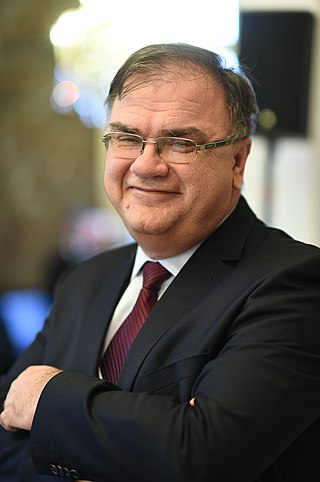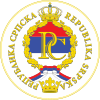The politics of Bosnia and Herzegovina are defined by a parliamentary, representative democratic framework, where the Chairman of the Council of Ministers of Bosnia and Herzegovina, named by the Presidency of Bosnia and Herzegovina, is the head of government. Executive power is exercised by the Council of Ministers of Bosnia and Herzegovina and the Presidency of Bosnia and Herzegovina. Legislative power is vested in both the Council of Ministers and the Parliamentary Assembly of Bosnia and Herzegovina. Members of the Parliamentary Assembly are chosen according to a proportional representation system. The judiciary is independent of the executive and the legislature.

The General Framework Agreement for Peace in Bosnia and Herzegovina, also known as the Dayton Agreement or the Dayton Accords, and colloquially known as the Dayton in ex-Yugoslav parlance, is the peace agreement reached at Wright-Patterson Air Force Base near Dayton, Ohio, United States, finalised on 21 November 1995, and formally signed in Paris, on 14 December 1995. These accords put an end to the three-and-a-half-year-long Bosnian War, which was part of the much larger Yugoslav Wars.

Republika Srpska is one of the two entities of Bosnia and Herzegovina, the other being the Federation of Bosnia and Herzegovina. It is located in the north and the east of the country and has a population of 1,228,423 people as of the 2013 census. Its largest city and administrative centre is Banja Luka, lying on the Vrbas river, and with a population of about 138,963 people.

The Republic of Serbian Krajina or Serb Republic of Krajina, known as the Serbian Krajina or simply Krajina, was a self-proclaimed Serb proto-state, a territory within the newly independent Republic of Croatia, which it defied, and which was active during the Croatian War of Independence (1991–95). It was not recognized internationally. The name Krajina ("Frontier") was adopted from the historical Military Frontier of the Habsburg monarchy (Austria-Hungary), which had a substantial Serb population and existed up to the late 19th century. The RSK government waged a war for ethnic Serb independence from Croatia and unification with the Federal Republic of Yugoslavia and Republika Srpska.

Mladen Ivanić is a Bosnian Serb politician who served as the 6th Serb member of the Presidency of Bosnia and Herzegovina from 2014 to 2018. He is the founder, member and former president of the Party of Democratic Progress.

Momir Bulatović was a Yugoslav and Montenegrin politician. He was the first President of the Republic of Montenegro from 1990 to 1998, after which he served as the Prime Minister of the Federal Republic of Yugoslavia from 1998 until 2000, when Slobodan Milošević was overthrown. He was a leader of the Montenegro's Democratic Party of Socialists from 1989 to 1997, when he split from DPS after a conflict with Milo Đukanović.

The Republika Srpska was a self-proclaimed statelet in Southeastern Europe under the control of the Army of Republika Srpska during the Bosnian War. It claimed to be a sovereign state, though this claim was only partially recognized by the Bosnian government in the Geneva agreement, the United Nations, and FR Yugoslavia. For the first six months of its existence, it was known as the Serbian Republic of Bosnia and Herzegovina.
Four major international peace plans were proposed before and during the Bosnian War by European Community (EC) and United Nations (UN) diplomats before the conflict was settled by the Dayton Agreement in 1995.

Milorad Dodik is a Bosnian Serb politician serving as the 8th president of Republika Srpska since 2022, having previously served from 2010 to 2018. He also served as the 7th Serb member of the Presidency of Bosnia and Herzegovina from 2018 to 2022.

The Alliance of Independent Social Democrats is a Serb political party in Bosnia and Herzegovina. Founded in 1996, it is the governing party in Republika Srpska, with its leader, Milorad Dodik, serving as the current president of Republika Srpska. The party's vice-president, Željka Cvijanović, is the current member of the Presidency of Bosnia and Herzegovina, while SNSD member Radovan Višković is the current prime minister of Republika Srpska.

The Republic of Bosnia and Herzegovina was a state in Southeastern Europe, existing from 1992 to 1995. It is the direct legal predecessor to the modern-day state of Bosnia and Herzegovina.

The Croatian Republic of Herzeg-Bosnia was an unrecognized geopolitical entity and quasi-state in Bosnia and Herzegovina. It was proclaimed on 18 November 1991 under the name Croatian Community of Herzeg-Bosnia as a "political, cultural, economic and territorial whole" in the territory of Bosnia and Herzegovina, and abolished on 14 August 1996.
The Graz agreement was a proposed agreement made between the Bosnian Serb leader Radovan Karadžić and the Bosnian Croat leader Mate Boban on 6 May 1992 in the city of Graz, Austria. The agreement publicly declared the territorial division between Republika Srpska and the Croatian Community of Herzeg-Bosnia and called for an end of conflicts between Serbs and Croats. The largest group in Bosnia and Herzegovina, the Bosniaks, did not take part in the agreement and were purposefully not invited to the negotiations.
An independence referendum was held in Bosnia and Herzegovina between 29 February and 1 March 1992, following the first free elections of 1990 and the rise of ethnic tensions that eventually led to the breakup of Yugoslavia. Independence was strongly favored by Bosniak and Bosnian Croat voters while Bosnian Serbs boycotted the referendum or were prevented from participating by Bosnian Serb authorities.
A referendum on remaining in Yugoslavia was held in the parts of Bosnia and Herzegovina with a significant Serb population on 10 November 1991. The referendum was organised by the Bosnian Serb Assembly and asked two questions; to Serbs it asked:
Do you agree with the decision of Assembly of the Serbian people in Bosnia and Herzegovina of October 24, 1991, that the Serbian people should remain in a common Yugoslav state with Serbia, Montenegro, the SAO Krajina, SAO Slavonija, Baranja and Western Srem, and with others who have come out for remaining?
A referendum on the Contact Group plan was held in Republika Srpska on 28 August 1994, after the National Assembly had rejected the plan on 8 August. The plan would give 49% of Bosnia and Herzegovina to Serbs, around a third less than they held at the time. It was rejected by 97% of voters. Following the referendum, Bosnian Serb President Radovan Karadžić said "We will ask for another map... We expect a new conference, new peace efforts." However, the Contact Group claimed the referendum was a sham.
The partition of Bosnia and Herzegovina was discussed and attempted during the 20th century. The issue came to prominence during the Bosnian War, which also involved Bosnia and Herzegovina's largest neighbors, Croatia and Serbia. As of 2024, the country remains one state while internal political divisions of Bosnia and Herzegovina based on the 1995 Dayton Agreement remain in place.
Several referendums have been held in Republika Srpska during its existence, whilst others have been proposed but not happened.

The Dayton Agreement ended the Bosnian War and created the federal republic of Bosnia and Herzegovina (BiH), which consists of the Bosniak and Croat-inhabited Federation of Bosnia and Herzegovina (FBiH) and the Serb-inhabited Republika Srpska (RS). Although the Bosnian Serbs were viewed as "anti-Dayton" during the first years after the war, since 2000 they have been staunch supporters of the Dayton Agreement and the preservation of RS. Bosniaks generally view RS as illegitimate, and an independence referendum from BiH has been proposed in RS. The 2006 Montenegrin independence referendum and Kosovo's 2008 declaration of independence have raised the possibility of a referendum and unification with Serbia. In 2015, after a judicial and police crisis, the governing Alliance of Independent Social Democrats said that it would hold an independence referendum in 2018 if RS's autonomy was not preserved. Almost all people vote for pro-independence parties.

A referendum on the National Day of Republika Srpska, called the Day of Republika Srpska was held on 25 September 2016. The Constitutional Court of Bosnia and Herzegovina had on 26 November 2015 ruled against the constitutionality of the holiday, deeming it discriminatory against non-Serbs in the entity. The Day of Republika Srpska falls on 9 January, which is both an Orthodox feast day and the date when the Bosnian Serb republic was declared in 1992 although Serbian Orthodox Church venerates saints on each day in a year. The result was 99.8% in favour of keeping the date.











